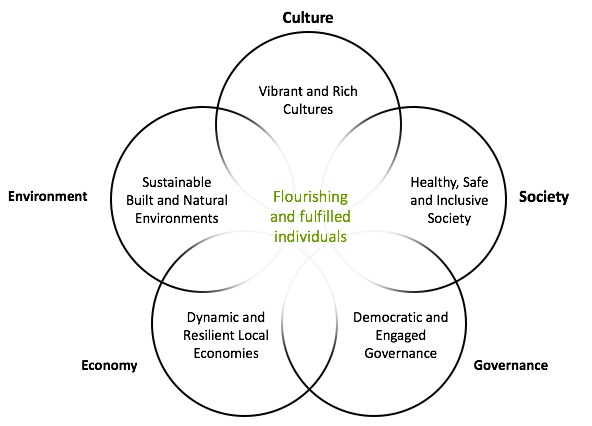This page articulates the five public policy domains for local government planning and activity on which this Framework is based, the theory that underpins them and the reasons for using them.
This Framework recognises five public policy domains of local governments’ work: Cultural, Social, Economic, Governance and Environmental. All council goals and related activity can be considered within these domains, and together they enable the desired endpoint of flourishing and fulfilled individuals.
Each domain includes articulation of a relevant desired goal, which can be construed as an outcome– (what would we want our community to look like?). These goals also have values implicit in them. For example, in the cultural domain, if a rich and vibrant culture is a goal, this is predicated on values related to cultural richness and vibrancy.
Figure 1: Policy domains depicted as an integrated whole
Policy domains assist cultural development planning by helping:
- make the connection between cultural activity and council’s goals
- articulate outcomes of a cultural development plan and the range of appropriate measures to evaluate change
- align plans with UCLG’s Policy Statement on Culture: ‘connection to other policy areas which aims to ensure that ‘. . . culture has its rightful place in all public policies, particularly those related to education, the economy, science, communication, environment, social cohesion and international cooperation’ (UCLG, 2010, Part 2).
The domains, their associated goals, underpinning values and descriptions are offered below. This schema was first informed by Community Indicators Victoria (CIV) holistic schema of community wellbeing.
Policy domain: Cultural
Goal: vibrant and rich cultures.
Underpinning values: cultural richness and vibrancy.
Policy domain: Social
Goal: healthy, safe and inclusive society.
Underpinning values: good health, safety and inclusion.
Policy domain: Economic
Goal: dynamic and resilient local economies.
Underpinning values: economic dynamism and resiliency.
Policy domain: Governance
Goal: democratic and engaged governance.
Underpinning values: democracy and community engagement.
Policy domain: Environmental
Goal: sustainable built and natural environments.
Underpinning values: sustainability of the built and natural environment.
References
Community Indicators Victoria (2015). About us. Melbourne: Community Indicators Victoria.
UCLG Committee for Culture (2010). Policy Statement on Culture. Barcelona: UCLG.
Wiseman, J., Heine, W., Langworthy, A., McLean, N., Pyke, J., Raysmith, H., & Salvaris, M. (2006). Victorian Community Indicators Project Final Report. Melbourne: the Institute of Community Engagement and Policy Alternatives (ICEPA), Victoria University, the VicHealth Centre for the Promotion of Mental Health and Social Well Being, School of Population Health, University of Melbourne and the Centre for Regional Development, Swinburne University of Technology.


